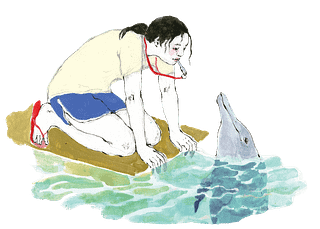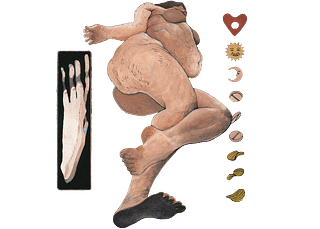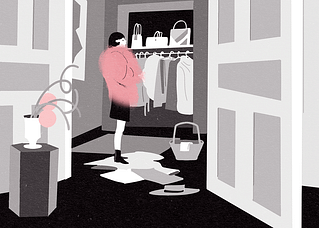
After our three-year-old son died, my husband and I started having sex several times a day, in any repellent or ill-advised location we could discover. In the bathroom at the public library, on our landlady’s waterlogged, fungus-beflowered basement sofa. I handjobbed him to an orgasm driving sixty miles an hour in our Honda Civic on the Pennsylvania Turnpike. At the moment of crisis, he grazed the center median and bounced off, nearly side impacting a beige minivan with four little children staring out the back. We wanted death, lots of death, bouquets of death blooming and raining down on us from the tall trees. We were done with cowardice and being control freaks. Our ancestors had devoted a great percentage of their cranial capacity to surviving Cossacks, exile, and less permanent forms of soul eradication. My husband and I inherited this summa cum laude in preserve and protect. We were A-plus in watchful anxiety, had all the doohickeys: cabinet locks to prevent little hands from getting into the Drano, canny plastic sleeves to bundle blinds cords, a stroller crash-tested by Consumer Reports, vaccinations always on schedule. We often stood watching our son breathe at night — best to be certain. Now we were, in fact, certain. I liked to be on top with my husband, withholding at crucial moments, making him beg. I intended never to give anybody anything for free again. Our climaxes were angry and dry-eyed, tiring us just enough that we could sleep our parched sleep at night.
One 3 A.M. I woke to the bedroom lights blaring and my husband standing by the side of the bed, fully dressed, jacket and overcoat. “Let’s go,” he said. I pulled on jeans, a sweater. I barely had time to grab my coat and follow him out the front door, reach in my pocket for an absent apartment key. What was there to lock up? My aunt Carol’s pearls, a ten-year-old iMac. Our passports. Let the world come in and rummage. Let them shop among our sad treasures.
My husband walked fast across the avenue, several blocks, and then down the steps of the Twenty-Third Street subway station. Behind the bulletproof glass of the booth, a blurry transit employee watched or did not watch as my husband clambered over and I wriggled under twin turnstiles. He was a weak man, my husband, but when he finally bit down on an idea, he was incapable of relinquishing it. Were we going to jump in front of the 6 train? It would be a quick death — did we deserve quick? Did we deserve such theatricality? It occurred to me that some poor soul would have the gruesome task of hosing us off the rails.
We were on the downtown platform, moving quickly — I watched the thin tufts of hair rise and fall, rise and fall at the base of my husband’s skull.The platform was empty of all but a lone figure, gender uncertain, humped on a bench under a large quilt. It bolted upright at our steps: a woman, wild-haired, gray, insulted, terrified. She held our gaze, trying to gauge our level of humanity. As we passed she murmured a hasty private prayer. A door in the wall — EMPLOYEES ONLY — probably housed tools or a rat village or Bluebeard’s wives hanging up in rows. I rattled the knob — no luck. The platform narrowed and narrowed until it reached a terminal V, whereupon my husband turned and smiled grimly, thrusting one hand into his tweed jacket. A gun? I was sorry to have underestimated him. What researches, what foreplanning and follow-through, must have been involved in the acquisition of a gun! I’d never laid eyes on a real firearm. I imagined something out of the Old West, with an embellished wooden handle: a feminine touch. I figured my husband would shoot me first, then himself. The himself part I counted on. It was the only thing I had left, the faith that whatever was coming, we would do it together. I imagined the smoky explosion and hot lead tearing through my heart, separating its chambers into petals that would open and droop the way you see in one of those sped-up videos of the life cycle of a flower. Birth to death in under five seconds.
The sound of the train arrived, shouting into our ears, then the train itself. My husband withdrew his hand. The mysterious timing of arrivals and departures was offering us a little more time to be alive. We entered the car already grappling, hands worming under coats, pants unzipping. I backed against a center pole, my husband heavy against me, inside me. I felt him fully, without reserve. The pleasure was immense and unforgivable. If he placed the gun in my mouth right now I would swallow it, accept it. Dimly in my ecstatic travels I was aware that he remained on a lower plane than I, furtive and hurried. I gazed down on him from my great height. What timidity kept him from joining me in obliteration?
The car door opened at Union Square and thumping bass and obscenities preceded a kid inside. I was capacious; I could register him in the midst of my planetary orbits. He had skinny dreadlocks and was maybe seventeen. He seated himself near the door, not noticing us or not caring, nodding to his music, eyes opening and closing, opening and closing again. It was this blinking — alive/dead/alive/dead — that shook me from my transit. Abruptly, cold bled into my veins. “Wake up!” I hissed. Who in this trickster universe had given him fourteen extra years? My husband continued to work, work, busy, busy, pressing my spine against the pole. “Wake up!” I shouted at the boy. I intended to waste a few minutes of his bounty. I wanted him to look at me, to acknowledge ruin. His head jerked up, froze, then jerked away. Coward, I thought, unfairly: he was a child. My husband gave a throaty grunt and collapsed against me. After a moment he straightened up, zipped, and adjusted. He sneezed.
We were approaching the Brooklyn Bridge; I reassembled myself. The doors opened and my husband led us out. His pace slowed as we entered the night, just a couple taking a 3:30 A.M. stroll near the island’s waters. The streets around the bridge were empty and unlit. Loose pebbles turned my ankles and twice I flung out my hand toward my husband to right myself, a reflex that humiliated me. He might be the leader now, but I would not be the more fragile. I kept my gaze straight ahead to give the criminal elements ample time to come out of the night and commit what the newspapers would describe as a senseless act. It would be a relief to turn the task over to someone else. But shadows shifting at the periphery slanted away or dissolved as we passed. We drew closer to the bridge and I saw the beauty of the plan. Our son had drowned in a rubber pool at a friend’s upstate. (We’d had friends then.) Now we would join our bodies to his in the same betraying medium.
Fortune smiled upon us: not a single soul, in this city of eight million, had had the same idea tonight, to climb high among the light-beaded cables that cast a greenish sheen on the dark waters below. Still, there were cars and trucks that shivered the walkway beneath us as they passed. We were short of breath as we reached the first tower, Manhattan behind us gleaming gold and silver. Ahead, more brick, less steel, fewer lights. Brooklyn’s skyline still retained the color palette, ruddy and tan, of the industrial past: the bygone years of boats, sweat, smoke, typhus, malaria. Below, the East River, glittering like emeralds but foul beneath, pocked with malformed fish, and cold, cold.
At the center of the bridge, my husband stopped and removed his overcoat, placed it neatly at his feet. Once I’d known the number of workers who died building this span, but I had long ago forgotten. Twenty, two hundred, what did it matter? They were scratches in history books. Not even that — they had no individual names. “Give me the gun,” I told my husband. I wanted to hold it, to feel its heft and power. We were not the sort of people who owned or fired guns. We had never believed, until now, in willed death. Life, life, life! had been our mantra: life and nurturance, life and infinite potential, life and seeing-it-from-their-point-of-view. La la la la la. Death had been for the crude, the lazy, and the unimaginative. Those who forgot to take their fucking pills. Life, life, life, life! I was sick of its snobbery, its standards.
My husband frowned. The wind lifted and lowered the lapels of his jacket. Shooting, jumping, shooting and then jumping: it was muddled in my mind. Which was the best way to go? Brooklyn nodded at us from across the water. My husband took off his jacket and folded it on top of his overcoat. Confused, I knelt down and felt around in it, bunching the fabric, scrabbling my hands into the armholes. No gun. Bitterness swooped over me: I had wanted flash and roar, combustion in our departure. And now I flinched, looking down into the water, imagining the long, sleek plunge.
Calmly, my husband wrested the jacket away from me and refolded it in place. He took off his shirt and his undershirt. He stood quietly until I saw that I was to follow. I took off my coat and sweater and stacked them in a pile next to his. My breasts were greenish marble in the glow cast by the strung lights. He took off his pants. There he was, the skinny, stoop-shouldered man I’d once believed possessed whatever knowledge I needed and the ability to make me whole.
Still he stood. I reconsidered past judgments: perhaps he had never been weak but had simply understood how to wait. I took off my jeans, my shoes. I no longer felt any ownership of these things, any belief in their ability to screen me from scrutiny. He took off his shoes and socks and underpants. I took off my underpants. He took off his watch. His wedding ring. I took off my wedding ring. We stared at the neat piles and whimpered as the harsh wind cut against our bodies. A car passed with the window rolled down, and a voice called out, “Perverts!” Yes, I thought. We are perverts and murderers and rapists, too. We have blasphemed and committed treason. We have eaten forbidden foods, behaved frivolously, spoken nonsense. We have stolen valuables, cheated our employers, been arrogant, behaved disrespectfully to elders. We have gossiped, spread rumors, acted cynically, extorted. We have been envious, given bad advice, and lost our tempers. We have mocked and ridiculed others, sworn falsely and in vain. We have oppressed those who work for us. We have taken bribes and failed to comfort the widow and the orphan. We have allowed our child to drown in a spoonful of water.
The wind whipped us, and we clung together. His sharp chin dug into my neck, and my nose drove into his collarbone. We stood there until I could feel neither hands nor feet nor face. We were a fused slab, one body, as creating a child had once made us. Time passed, short or long. I felt my husband relinquish his hold, the cold pass between our bellies. I knew what to do. I hoisted myself onto a beam and reached to grab one of the twisted cables that rose diagonally to the tops of the towers. How graceful they were when you saw them from afar, like the lines on a musical staff. Sensation returned to my hands: a slow burning, then a deep one. I pushed clumsily with my heels, fire along my skin from chest to thigh as I hoisted myself up the cable fist over fist. I wanted height, to feel myself leave the earth moonward first. Straining, batted by the wind, I climbed until my head became part of the dark sky. Then I looked. The smear of dark water, the hooded lights of Manhattan, the figure of my husband clinging to the cable next to mine but lower down. I imagined I could hear his breathing. Death was very near, a rumor that had finally materialized. It would be very deep, very long, and, like my husband, insufferably patient. My son would be down there with his wide-open eyes, those blue-irised starburst eyes.
My husband let go, arms thrown back, his body rotating a quarter turn and then rolling gently to its right side as he hit the water. An enormous crack and the river boiled. I shrieked, exultant, but my grip, so tight, would not unclench. I speared my will into my frozen fingers. My heart — that forgotten organ! — pumped devilishly, mocking me: still here/still here/still here.
My hands slipped an inch. One ankle, surprised free, kicked chaotically, then wrapped itself in the cable again. I slid another inch. My heart danced and insulted me: Traitor, traitor. Two more inches, four, six, a dozen, until at last I fell to the walkway, palms and belly stripped, knees curled in. Perhaps one could still die this way, merely by being still and inoffensive. But I suspected not. I rose onto hands and knees and crawled to the piles of clothing. In the acid light I gathered what was mine — jeans, shoes, sweater — and held it to my chest.
My feet were stone but they knew where to go. Naked, slowly, I descended the long ramp. Where the path leveled, the city fell back to give me place. I heard nothing of what was said to me as I continued into the streets, my flesh lit up and snuffed out again and again by the streetlamps of downtown. Next to a closed bodega a form sat sleeping, a sign propped against his knees: FUCK YOUR CHARITY. I bent and placed my bundle next to him.


